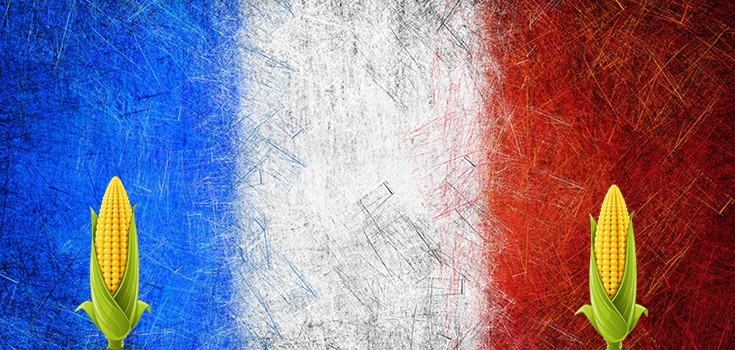Vive La France: Country Bans Monsanto MON 810 GMO Corn – Developing Story

France has a long history with opposition to GMOs, namely biotech giant Monsanto’s MON 810 GMO maize. The country instituted bans and moratorium’s of the GMO corn crop, often met with resistance from the European Union. Here is a little history about France and the genetically modified maize, MON 810.
In 2008, France made a move to ban Monsanto’s Bt MON 810 variety – a form of genetically modified corn that was engineered to deter pests from eating it.
MON810 is genetically modified (GM) to produces the Cry1Ab protein via the incorporation of a cry1ab coding sequence derived from Bacillus thuringiensis – a species of bacteria that lives in soil. The Cry1Ab protein provides protection against certain lepidopteran insect pests.
Essentially, the technology is used here to combat crop loss due to insects.
MON810 was developed by Monsanto in the 1990s.
In late 2011, France’s Council of State, which advises the government on legal issues and is the nation’s highest administrative court of appeal, upheld a September European Court of Justice ruling that found that France’s 2008 prohibition against Monsanto’s MON810 variety was out of line on procedural grounds.
The organization justified its decision by saying that the government did not give enough evidence to justify a ban.
In response, France asked the European Commission to suspend authorization to Monsanto’s genetically modified corn. The news came after France charged Monsanto with chemical poisoning after it was found that a farmer had suffered severe adverse health reactions as a result of exposure to Monsanto’s Lasso weed killer.
In September, 2012, France was given the green light to maintain a temporary ban on the cultivation of genetically modified crops.
Mid-2013, after announcing the ban would be lifted, President Francois Hollande stated that the moratorium would actually be extended despite actions by what is, in essence, the supreme court of his government – The Council of State.
The Council of State acts as legal adviser to the President and as the supreme court of administrative justice. It was this council that overturned the ban on GM maize MON810. In their, the court said of the moratorium:
“Such a measure could only be imposed in an emergency or if there was a serious health or environmental risk.”
President Hollande, however, saw such risks present and committed to keep the ban in place. He says the ban was enacted, “not because we refuse progress, but in the name of progress.” He went on to add that GMO corn could have detrimental effects on agriculture as we know it:
“We cannot accept a maize product that may have adverse effects on other [agricultural] production.”
In early 2014, after back and forth legal battles, France’s agriculture ministry banned the sale, use, and cultivation of Monsanto’s MON 810 genetically modified maize, currently authorized in the EU. once again.
The French Ministry of Agriculture issued an emergency decree in March, 2014 just in time to prevent Mon 810 from being planted. Normal corn sowing season begins in March. The decree stated:
“The sale, use and cultivation of varieties of maize seed from the line of genetically modified maize MON 810 is banned in the country until the adoption, on the one hand, of a final decision, and secondly, of [EU] community action.”
The decree added that emergency legislation was needed “given the proximity of the beginning of the planting season.”
Other Nations Taking Similar Action
You don’t have to remain in the stranglehold of EU trade rules when it comes to GMO if you have a political ministry and activists strong enough to stand against GMOs.
Over the years during this back-and-forth with France and the GMO corn MON 810, numerous other countries took similar actions against GMOs.
- Nations like Hungary have taken a stand against GMO crops and Monsanto, destroying 1000 acres of maize found to have been grown with genetically modified seeds.
- Peru has also taken a stand for health freedom, passing a monumental 10 year ban on genetically modified foods. Amazingly, Peru’s Plenary Session of the Congress made the decision despite previous governmental pushes for GM legalization.
- Russia’s food safety regulator Rosselkhoznadzor announced a complete ban on all US corn and soy imports.
- Mexico launched a complete ban on the growth of GMO corn field trials that were previously planned to move forward.
- A decree was signed in Italy which will ban Monsanto’s MON810 maize, one of the two genetically modified crops currently legally grown in Europe and sold commercially.

so amateur to see sew and sow mixed up. go back to collage.
College? Perhaps Vacation Bible School would be better. Natural Society has reaped what has been sown… ignorance!
Yes, please changing to “sowing” season!
Seed is not “sewn” during “sewing” season, children…